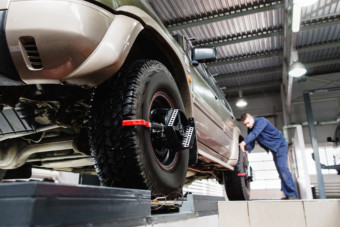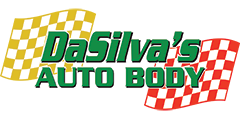
In this case, misalignment places a higher degree of stress on key parts of your car and makes your vehicle harder to drive. At this point, it’s advised you have an auto body technician check your vehicle’s alignment and make the necessary adjustments.
Signs of an Alignment Issue
A combination of the following can indicate an issue with your car’s alignment:
- Your car drifts to the left or right, even when the steering wheel is centered.
- The steering wheel starts to vibrate or wobble when you move, especially at high speeds.
- Your tires show uneven signs of wear: Inconsistences along the edges, a high degree of wear in a single spot or premature wear.
- You find yourself regularly adjusting the steering wheel or find it has shifted out of position.
- Your tires squeal when you move.
These signs do not come out of nowhere. Often, they can be traced back to:
- Sudden impact: Even hitting the curb can throw your car’s chassis out of alignment and damage suspension components.
- Normal wear and tear: Parts of the suspension system wear down over time, even when you don’t have an accident. In turn, this affects how the suspension and steering system operate.
- Front axle issue: A key part of the steering system, poor front axle performance might go back to a CV joint issue. In the process, the steering wheel – if not the full front of the car – vibrates or you hear a clicking noise when you start your car.
In any case, fixing your car’s alignment:
- Improves gas mileage
- Places less wear and stress on your tires
- Improves your ability to control your car on the road
Alignment Services
If you suspect an alignment issue, bring your car into DaSilva’s for our technicians to assess your vehicle. What services can we perform?
- Alignment check: Our team uses diagnostic tools to ensure your wheels align with the manufacturer’s original specifications. In the process, we’ll also examine your tires, air pressure, suspension system and steering components.
- Re-alignment: Based on the findings, our team may make rear- or front-end mechanical adjustments. This is often recommended every 6,000 to 10,000 miles, or if you’ve recently been in an accident.
- Tire rotation: Along with an alignment check, tire rotation may be needed. This process moves the tires from front to back and side to side, in order to keep the wear even.
- Part replacement: During an inspection, it may appear that certain parts of your suspension system are too worn out and need to be replaced before our team can align your chassis. These parts include ball points, sway bar or center links, rack and pinion arms, CV joints, axle half shafts, shock absorbers, struts, coil springs and universal joints and springs.
Rather than steer against your car, schedule an appointment with DaSilva’s Auto Body to have your car’s alignment examined. To get started, call our Naugatuck location today!

